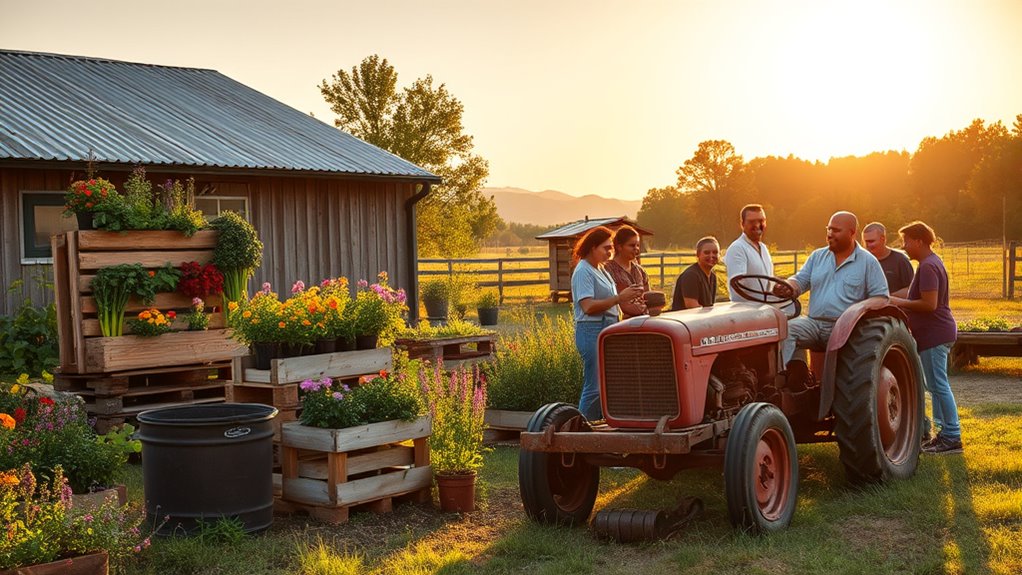Owning a farm with little to no money is possible if you start small and seek lower-risk opportunities. Look for free or low-cost land options, and explore creative funding solutions like crowdfunding or community grants. Build essential skills and diversify your products to boost income. Utilize local resources and engage with community support for added strength. By connecting with others and using technology, you can enhance efficiency and sustainability. There's more to discover that can help you on this journey.
Key Takeaways
- Investigate free land programs and community land trusts to secure affordable land options for farming.
- Consider leasing land or communal arrangements to reduce costs and share resources.
- Utilize crowdfunding platforms and government grants to finance initial farming ventures.
- Participate in community-supported agriculture (CSA) for steady income and reduced financial risk.
- Collaborate with local farmers and chefs to enhance marketing efforts and access new markets.
Starting Small: The Key to Low-Risk Farming
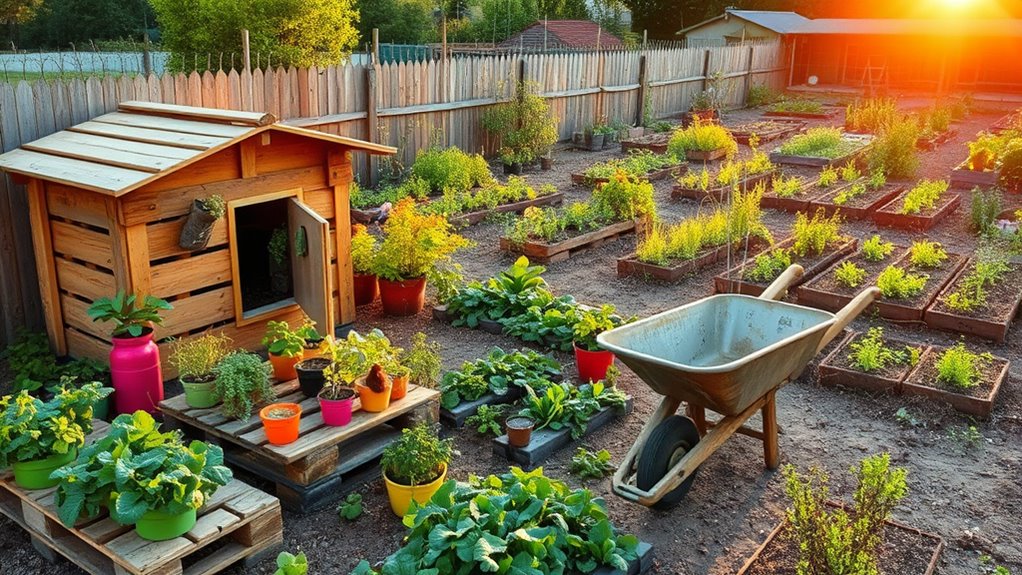
When you start small, you're not only minimizing your initial investment but also setting yourself up for a more manageable and less risky farming experience. This approach allows you to gradually expand as you gain experience and resources. By limiting the area you farm, you reduce financial risks, making it easier to bounce back from setbacks. You'll also develop essential skills without the overwhelming pressure of a large-scale operation. Testing different crops and market strategies becomes feasible with minimal financial exposure, enabling you to refine your methods. Additionally, managing a small mixed herd of livestock, such as sheep and goats, can enhance productivity without a significant financial burden. Plus, small-scale farming often emphasizes sustainability, focusing on eco-friendly practices that enhance soil health and biodiversity, ensuring a more resilient farming future. Furthermore, incorporating elderly care principles can help create a supportive and nurturing environment that fosters growth and well-being for all involved. Additionally, understanding survivalism and self-reliance can provide valuable insights into efficient farming techniques and resource management.
Accessing Free or Low-Cost Land Opportunities
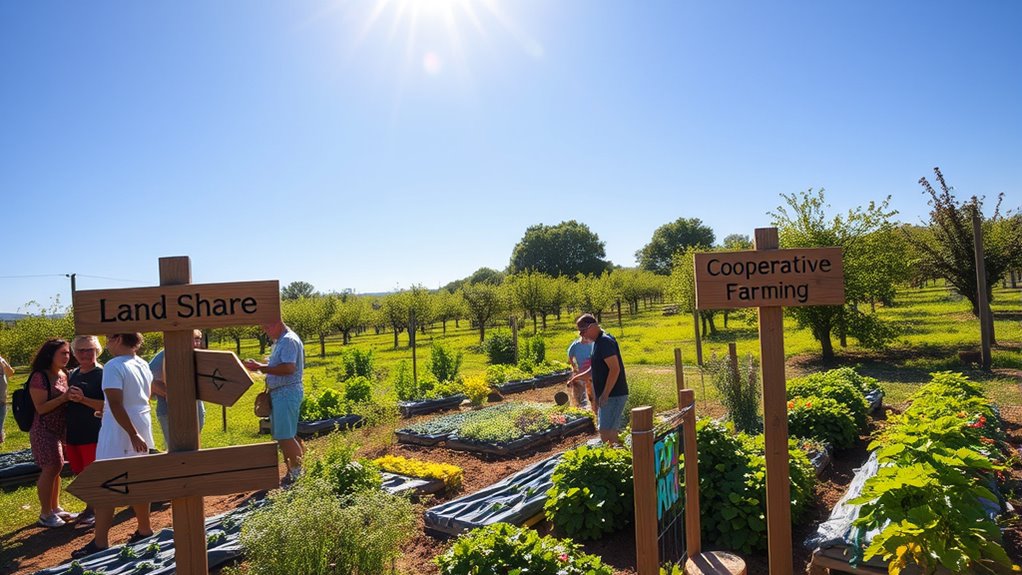
Accessing free or low-cost land opportunities can significantly reduce the barriers to starting your farming journey.
Look into free land programs in rural areas like Nebraska and Kansas, where revitalization efforts aim to boost local economies. You may need to meet specific construction deadlines and community engagement requirements, but the incentives can be worth it.
Urban homestead programs, like those in Buffalo, NY, offer land to improve neglected areas, requiring you to bring properties up to code within a set timeframe.
Also, consider leasing land or participating in communal arrangements, which allow you to share resources and responsibilities.
Keep an eye on local auctions and classified ads for affordable options, and don't hesitate to negotiate directly with landowners.
Creative Funding Solutions for Aspiring Farmers

Finding creative funding solutions can be a game-changer for aspiring farmers who may not have deep pockets.
Consider joining a rural investment cooperative, where you can pool resources with others to access land and capital. You might also leverage community support through crowdfunding platforms like Kickstarter or GoFundMe to gather small contributions from many supporters.
Explore community land trusts that offer affordable land leases or look into government grants and loans through the USDA's Farm Service Agency.
Additionally, alternative lending platforms, such as Harvest Returns, provide flexible financing options.
Embracing these creative avenues can help you secure the funding you need to kickstart your farming journey without breaking the bank.
Building Essential Skills and Knowledge

Building essential skills and knowledge is crucial for anyone looking to own a farm, especially if you're starting with limited resources.
Essential skills and knowledge are vital for aspiring farmers, particularly those beginning with limited resources.
Focus on developing organizational skills to manage cash flow and schedules effectively. Gain hands-on experience through volunteering or community gardening to understand farm operations, crop management, and animal care. Sustainable fashion practices can also inspire innovative approaches to farming. Engaging with community members interested in personal development can also provide valuable insights and support.
Take agricultural courses or seek mentorship from experienced farmers for foundational knowledge. Improve your technical skills by learning to operate and repair machinery, which cuts costs.
Additionally, enhance your communication skills to build strong relationships with suppliers and customers. Stay updated on sustainable practices and market trends through research and networking, as this will help you make informed decisions on your farming journey. Consider exploring funding options available for new farmers to support your financial needs.
Diversifying Products and Services for Increased Revenue

Diversifying your farm's products and services not only boosts revenue but also helps mitigate risks associated with market fluctuations.
You can create value-added products like jams or artisanal cheeses to tap into niche markets. Consider focusing on specialty crops that thrive in your region, and explore organic farming for premium pricing. Additionally, utilizing solar-powered irrigation systems can enhance your crop yields and efficiency. Regular maintenance of your equipment, similar to waterproofing pop-up camper canvas, ensures longevity and effectiveness in your farming operations.
Offering agritourism experiences, like farm stays and guided tours, can attract visitors and generate extra income. Furthermore, hosting educational workshops engages your community while providing another revenue stream.
Collaborate with local restaurants for fresh produce distribution, or create an online store to sell directly to consumers. Additionally, understanding the importance of community resilience can enhance your farm's long-term sustainability and adaptability in changing market conditions.
Gradual Scaling and Expansion Strategies
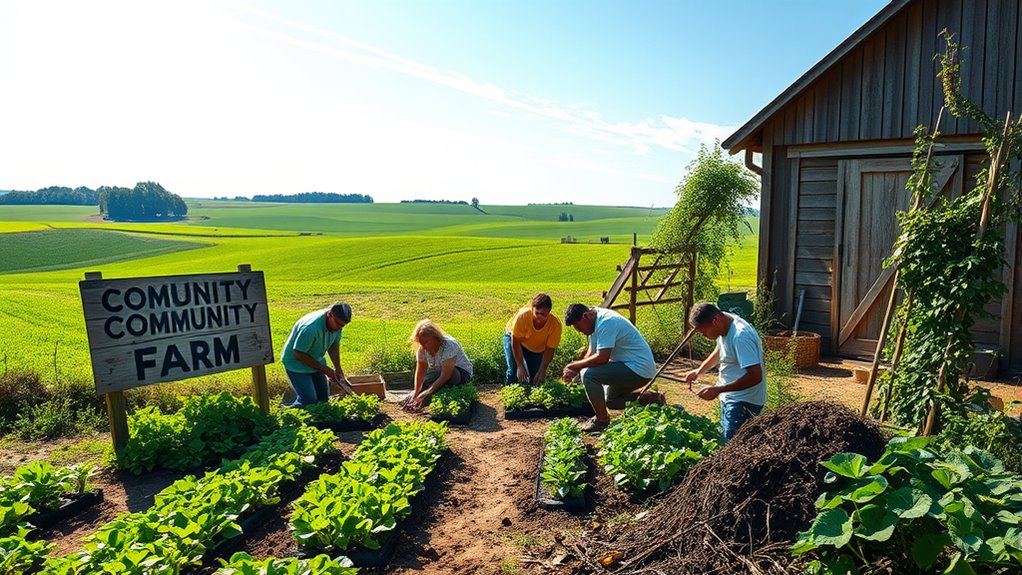
Expanding your farm sustainably requires a thoughtful approach that aligns with your current operations.
Start by gradually increasing your capacity—consider leasing additional land or livestock to enhance efficiency without overwhelming your finances. Replicate successful practices at new locations while investing in modern technology to boost productivity.
Form partnerships with neighboring farmers to share resources and expertise, minimizing costs.
Utilize short-term leases to test new strategies without long-term commitments, giving you flexibility as you grow.
Bootstrapping your expansion, seeking crowdfunding, or applying for government grants can provide necessary funds without incurring debt.
Utilizing Local Resources and Community Support
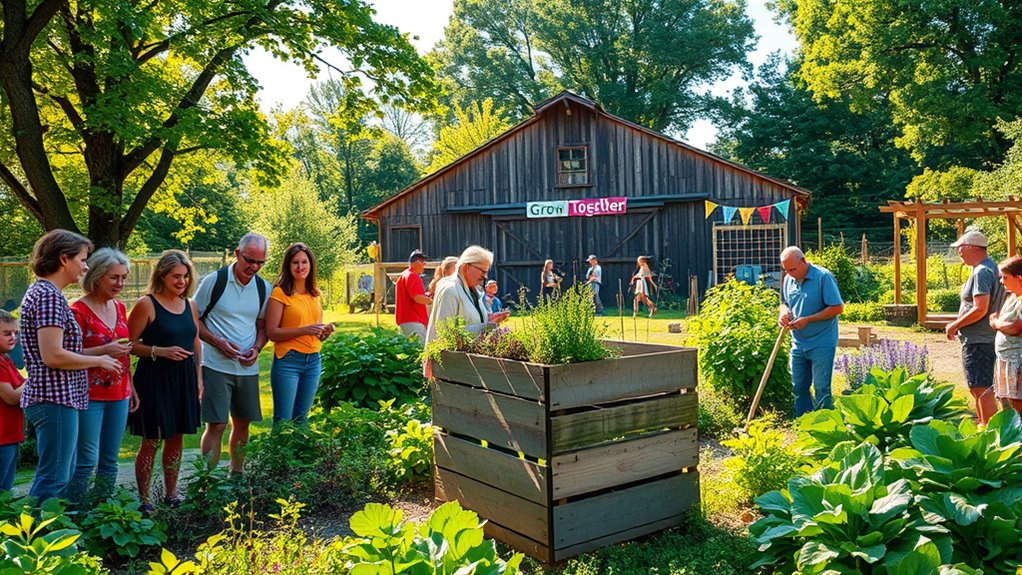
While starting a farm with limited funds can seem daunting, tapping into local resources and community support can make the journey more manageable and enriching.
Consider leasing land or sharing it with others to minimize costs. Collaborating with fellow farmers to share tools and equipment can also reduce your initial investment.
Engage in local markets to connect with consumers and understand market demands, while community events help build relationships with potential customers.
Join peer networks for knowledge sharing and support, and look for mentorship programs to learn from experienced farmers.
Don't forget to explore local grants and funding opportunities to help offset startup costs, ensuring you have the resources needed to thrive.
Exploring Volunteer Work for Hands-On Experience
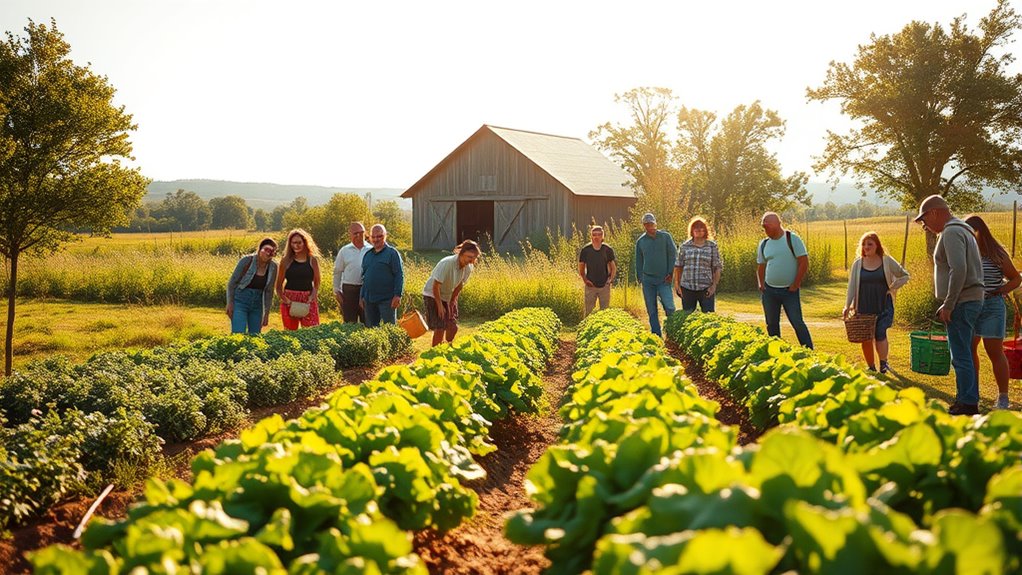
Building connections with local resources and community support sets the stage for further growth in your farming journey.
Volunteering on farms offers you hands-on experience in essential tasks like planting, harvesting, and weeding. You can also lend your carpentry or electrical skills to site projects, or contribute by cooking, cleaning, and even photography.
This experience helps you develop skills in organic farming and animal care, while deepening your understanding of sustainable agriculture. Platforms like Workaway connect you to global opportunities, often providing accommodation and meals in exchange for work. Engaging with local farmers and participating in community events enhances your networking, paving the way for future farming endeavors. Additionally, participating in cultural festivals can also provide significant insights into local agricultural practices and community values.
Embrace these opportunities to learn and grow!
Incorporating Technology for Efficiency

Incorporating technology into your farming practices can significantly enhance efficiency and productivity. Auto guidance systems using GPS steer your machinery, reducing overlap during tilling and planting.
Incorporating GPS auto guidance systems can greatly improve farming efficiency by minimizing overlap during tilling and planting.
Machine section control optimizes material use by automatically turning sections on and off. With variable rate technology, you can adjust application rates for fertilizers and seeds based on specific needs.
Precision irrigation conserves water without sacrificing crop performance.
Utilizing sensors for machine condition monitoring and crop health helps you perform timely maintenance and optimize inputs.
Autonomous tractors, drones, and farm management software streamline operations, making your tasks easier.
All these tools not only improve efficiency but also promote sustainability, ultimately leading to a more productive and environmentally friendly farm.
Networking and Partnerships: A Path to Success

Networking and partnerships can be key to your success in farming, especially when resources are tight. By engaging in collaborative farming initiatives, you can share equipment and reduce costs with fellow farmers.
Community-supported agriculture (CSA) programs provide a steady income stream, allowing consumers to buy shares of your products. Building relationships with local chefs and participating in farmers' markets helps you tailor offerings and secure consistent sales.
Engage in community events to connect with potential customers and partners, enhancing your visibility. Consider pooling resources with other farmers through cooperative models, which can amplify your expertise and marketing efforts.
Frequently Asked Questions
What Are the Essential Legal Requirements for Starting a Farm?
Starting a farm requires you to address several essential legal requirements.
First, choose a business structure like a sole proprietorship or LLC, as it affects taxes and liability. You'll need to register with local and state authorities and obtain an Employer Identification Number (EIN).
Don't forget about necessary business licenses and permits specific to your operation.
Plus, ensure compliance with zoning laws and any environmental regulations to avoid legal issues down the road.
How Can I Find a Mentor in Farming?
Finding a mentor in farming can be exciting and rewarding. Start by exploring local farming communities, attending networking events, and joining workshops.
Look into formal programs like GreenStone's CultivateGrowth or Marbleseed's Farmer-to-Farmer mentorship for structured guidance.
Reach out to experienced farmers you admire, and don't hesitate to ask for advice. Build relationships, stay engaged, and be open to learning—mentorship can be the key to your farming success!
What Insurance Do I Need for My Farm?
You'll need several types of insurance for your farm to ensure comprehensive protection.
Start with basic form coverage for common perils like fire and theft.
Consider broad form coverage for additional risks, and special form coverage for all-risk protection.
Don't forget liability coverage to protect against injuries or damages related to farm activities.
Depending on your operations, look into customizable policies to fit your specific needs and safeguard your assets effectively.
How Can I Effectively Market My Farm Products?
To effectively market your farm products, start by building a strong online presence with a user-friendly website and active social media engagement.
Share your farm's story and behind-the-scenes content to connect with customers.
Participate in local farmers' markets to engage directly with your community and host events to create memorable experiences.
Utilize email marketing and promotions to keep customers informed and excited about your products, fostering loyalty and encouraging repeat business.
What Are the Best Practices for Sustainable Farming?
To practice sustainable farming, you should focus on soil conservation by using no-till methods and crop rotation.
Incorporate cover crops to enhance soil health and implement efficient irrigation systems to conserve water.
Promote biodiversity by integrating agroforestry and using integrated pest management.
Manage livestock responsibly with pasture rotation and composting waste.
Regularly test your soil and develop nutrient management plans to optimize growth while minimizing environmental impact.
These practices create a thriving ecosystem.
Conclusion
Owning a farm with little to no money might seem impossible, but it's more achievable than you think. Did you know that around 30% of new farmers start on borrowed or shared land? By leveraging community support, exploring creative funding options, and building essential skills, you can turn your farming dreams into reality. Remember, starting small and staying resourceful can pave the way to success in the agricultural world. So, roll up your sleeves and get started!

